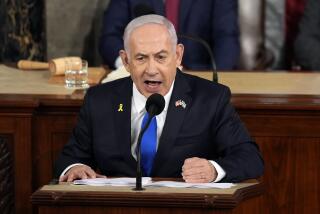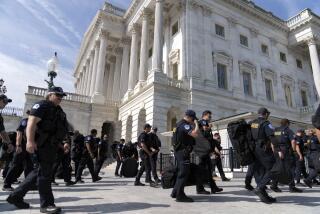Raucous Parliamentary Session Opens Wrangling in Israel Over Peace Accord : Mideast: Rabin has staked his government on the vote on PLO agreement. Protests are held outside Knesset.
- Share via
JERUSALEM — Besieged by protesters and nearly drowned out by their own shouting, Israel’s lawmakers opened a historic debate Tuesday on whether to approve their government’s peace accord with the Palestine Liberation Organization.
The vote on the accord, expected to come after three days of marathon wrangling, is so crucial that Prime Minister Yitzhak Rabin staked his government’s survival on it, saying it would amount to a vote of confidence.
“The government of Israel is giving the people of Israel a chance for peace, perhaps for the end of wars and violence,” Rabin told the packed house. “For 100 years, we’ve dreamed of peace.”
But outside the Knesset (Parliament), several thousand protesters gathered to let lawmakers know that they want no part of a peace that involves territorial concessions and may open the door to creation of a Palestinian state. And near the Damascus Gate of Jerusalem’s walled Old City, hundreds of protesters carrying Israeli flags faced off against opponents carrying Palestinian flags, spawning some scuffles with flagpoles.
“Rabin! Don’t Go Against the Jewish Majority!” urged one massive sign hanging in the park next to the Knesset. “Rabin! You Have No Mandate for Withdrawal!” declared another.
By all counts, Rabin is assured of squeezing by with a 61-member majority in favor of the peace accord in the 120-member Knesset. It is the “Jewish majority” that remains in question--whether he can garner the support he needs from ultra-Orthodox parties to claim the clear right to decide the Jewish state’s fate. If he cannot, he must fall back on the eight seats held by Israeli Arabs.
Members of the pivotal, ultra-Orthodox Shas Party, whose leaders have been plagued by corruption charges, appeared Tuesday to be holding out to the last, refusing to commit themselves despite merciless lobbying by Rabin’s allies.
They were reported to be attracted by calls from the opposition Likud Party for a nationwide referendum on the accord and for new elections to test support for Rabin’s policies.
“If you have elementary public responsibility,” Likud leader Benjamin Netanyahu told Rabin from the podium, “go to the people and ask for their confidence at new elections, because this people knows what it needs.”
Most recent polls, in fact, show a growing majority of Israelis favor the interim accord that Israel and the PLO signed last week. But Tuesday’s anti-agreement rally reflected an opposition that is also coalescing and organizing.
In what looked almost like a state fair, opposition groups--ranging from defenders of Jews’ water rights to an Orthodox women’s organization--set up booths in a park near the Knesset.
In an evening march by demonstrators from the Western Wall, Judaism’s holiest site, to the Knesset, professionally printed signs warning “Israel Is in Danger” abounded.
And the apartment buildings facing a main access road to the Knesset are now festooned with sheets proclaiming, “The People Are With the Golan,” a reference to fears that Rabin could give up the Golan Heights for peace with Syria.
In the Knesset, Netanyahu marshaled the opposition’s arguments in a 70-minute harangue that accused Rabin of accepting a peace agreement based on his own wishful thinking.
“Mr. Prime Minister, you don’t build a policy only on hope,” Netanyahu admonished.
He also called on Rabin to tell the Israeli people outright that the agreement effectively creates a Palestinian state not only in the Gaza Strip and Jericho, the first test spots of Palestinian self-government, but in all the areas occupied by Israel in 1967.
When Netanyahu went so far as to lambaste Rabin for burying his “head in the sand,” Rabin protested his rudeness and stalked from the hall.
But there were plenty of Parliament members left to carry on the battle. Knesset members lived up to their reputation for rowdiness and then some, heckling so wildly that a succession of frenzied chairmen looked likely to break their hammers as they pounded for order.
An especially loud furor erupted in the Knesset hall in the morning when two young men believed to be opponents of the peace accord trying to provoke a scandal raised a red, white, black and green PLO flag in the visitors’ gallery. A Jewish hard-liner yelled that the banner was a “murderers’ banner,” only to be called a murderer himself by a furious Arab colleague.
Rabin tried hard to allay lawmakers’ deep-rooted distrust of the PLO, arguing, “We cannot choose our neighbors, nor our enemies, even the cruelest ones.”
But that was not convincing enough for right-winger Rehavam Zeevi, who, when Rabin acknowledged that the hand of the PLO had spilled Jewish blood, exploded, “And you shake that hand!” This was a reference to Rabin’s controversial handshake with PLO Chairman Yasser Arafat at the accord’s signing in Washington last week.
A note of hope, however, came from Abdul-Wahab Darawshe of the Democratic Arab Party, who issued a formal invitation to Likud leader Netanyahu to come with him to the West Bank town of Nablus to see how things are already changing.
“I promise him and other Knesset members willing to join him,” he said, “to meet with the Palestinians, with the same people who fought with the state of Israel until today and were many years in prison and bore arms and still bear arms.”
The Jewish lawmakers, Darawshe said, “will be welcomed as neighbors, as people with whom a peace agreement can be reached.”
More to Read
Sign up for Essential California
The most important California stories and recommendations in your inbox every morning.
You may occasionally receive promotional content from the Los Angeles Times.













